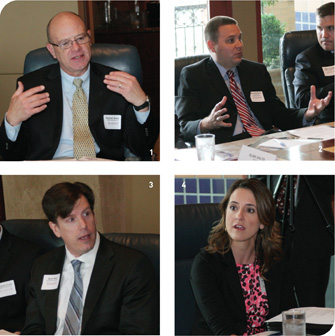
1. Small companies face serious challenges balancing affordability with insurance plans that pass federal muster, said Michael Avery. | 2. Ryan Huffman said federal regulators would quickly determine that fines for lack of insurance were too low. | 3. Employees will accept smaller provider networks if they can see the potential for better health-care overall, said Steve Best. | 4. ACA offers the prospect for improved continuity of care—once the bugs are worked out, said Jessica Lea.
Rowe believes that employers in that under 50-employee market are going to have to change the products that they offer, and the rating methodology will be totally different as well. In effect, the shopping and negotiating process is history. “Rate tables are going to be set, and the rates are the rates,” said Rowe. “That’s good news for some, but not so good for others.”
Kahle asked Michael Avery of ARMA International, a company with fewer than
three dozen employees, how Rowe’s projections of the rating structure would affect his outlook.
Avery believes that it will cause small employers, rightly or wrongly, to look more carefully at the health choices employees and would-be employees make. “There may be some options available that if we get through 2014, and some things get figured out,” said Avery, “and we have to take that one big hit, we’ll figure it out. But if it’s another hit and another hit . . . ”
“So the critical path,” said David Gentile, summarizing the plight of most small employers, “is that if you can find stability after the initial hit of 2014, through a variety of innovations, some introduced accountabilities inside your organization, and some collaboration with your broker and the carrier you select, that’s what will help give you hope.”
“Is it troubling to you that your wellness efforts, if in fact those are successful,” Kahle asked Avery, “are not going to be a factor in your future premiums?
“It’s disconcerting,” Avery agreed, but at the same time, he acknowledged that the company’s wellness program has had some ancillary effects like team building. Unfortunately, these accomplishments will not have a positive effect on insurance rates.
Reality Check
Alan Salts served up a reality check on how the system might well play out. As he observed, many new entrants will have no relationship with a primary-care physician and little interest in wellness. Worse, they have been led to think coverage is free. When they learn it is not, “The first thing they’re going to experience is rate shock.” Then, when they see how insignificant the penalties are, they will be tempted to say, “I’m out.”
In the first year of the program, an individual who chooses not to be insured will be asked to pay a whopping total of $95 for the year. Said Ryan Huffman, “The first thing that’s going to happen is that the government is going to realize the penalties are too low.”
How exactly those penalties will be collected is another issue. “Our friends at the IRS are going to monitor this,” said Wilson, which did nothing to ease anyone’s anxiety. As planned, if the individual cannot produce proof of insurance, the penalty will come out of his or her tax refund.
The IRS is hiring 16,000 new employees, but, as David Gentile noted, “There’s no enforcement.” As he explained, if the individual does not have a refund coming, there is no “meaningful way” the IRS can enforce the penalty. That individual will then access health care the way he had before, through the hospital emergency room.
The uncompensated care hospitals endure “is not going to go away,” said Gentile.
More problematic still are the new regulations on pre-existing conditions. Individuals “can choose not to jump into the pool,” said Danette Wilson, “and later if they do have an issue, they can decide.” There is a six-month open enrollment period that encourages a wait-and-see attitude about signing up. “After that, there are constraints,” said Gentile, “but you can manipulate them at some point.”
Service Industries
KBP Foods owns nearly 200 restaurants. “Your industry is vulnerable because of the new-entrant issue,” said Rick Kahle. “How are you determining who will be eligible in this new world?”